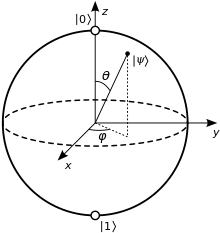Quantum computer

A quantum computer is a model of how to build a computer. The idea is that quantum computers can use certain ideas from quantum mechanics, such as superposition and entanglement, to perform operations on data. The basic principle behind quantum computation is that quantum properties can be used to represent data and perform operations on it.[1] A theoretical model is the quantum Turing machine, also known as the universal quantum computer.
The idea of quantum computing is still very new. Experiments have been done. In these, a very small number of operations were done on qubits (quantum bit). Both practical (meaning in the real world) and theoretical (meaning just thinking) research continues with interest, and many national government and military funding agencies support quantum computing research to develop quantum computers for both civilian and military purposes, such as cryptanalysis, or breaking codes.[2]
Today's computers, called "classical" computers, store information in binary; each bit is either on or off. Quantum computation use qubits, which, in addition to being possibly on or off, can be both on and off, which is a way of describing superposition, until a measurement is made. The state of a piece of data on a normal computer is known with certainty, but quantum computation uses probabilities. Only very simple quantum computers have been built, although larger designs have been invented. Quantum computation uses a special type of physics, quantum physics.
If large-scale quantum computers can be built, they will be able to solve some problems much more quickly than any computer that exists today (such as Shor's algorithm). Quantum computers are different from other computers such as DNA computers and traditional computers based on transistors. Some computing architectures such as optical computers[3] may use classical superposition of electromagnetic waves. Without quantum mechanical resources such as entanglement, people think that an exponential advantage over classical computers is not possible.[4] Quantum computers cannot perform functions that are not theoretically computable by classical computers, in other words they do not alter the Church-Turing thesis. They would, however, be able to do many things much more quickly and efficiently.
References[change | change source]
- ↑ "Quantum Computing with Molecules" article in Scientific American by Neil Gershenfeld and Isaac L. Chuang - a generally accessible overview of quantum computing and so on.
- ↑ Quantum Information Science and Technology Roadmap for a sense of where the research is heading.
- ↑ One photon Grover algorithm
- ↑ Lieven M.K. Vandersypen; et al. (1999). "Separability of Very Noisy Mixed States and Implications for NMR Quantum Computing". Phys. Rev. Lett. 83 (5): 1054–1057. arXiv:quant-ph/9811018. Bibcode:1999PhRvL..83.1054B. doi:10.1103/PhysRevLett.83.1054. S2CID 14429986.
Other websites[change | change source]
- Qubit.org (Centre for Quantum Computation)
- Institute for Quantum Computing
- QubitNews Archived 2010-06-18 at the Wayback Machine
- TechTudumArchived 2022-01-19 at the Wayback Machine (What is quantum computing?)
- Articles about quantum physics (free access)
